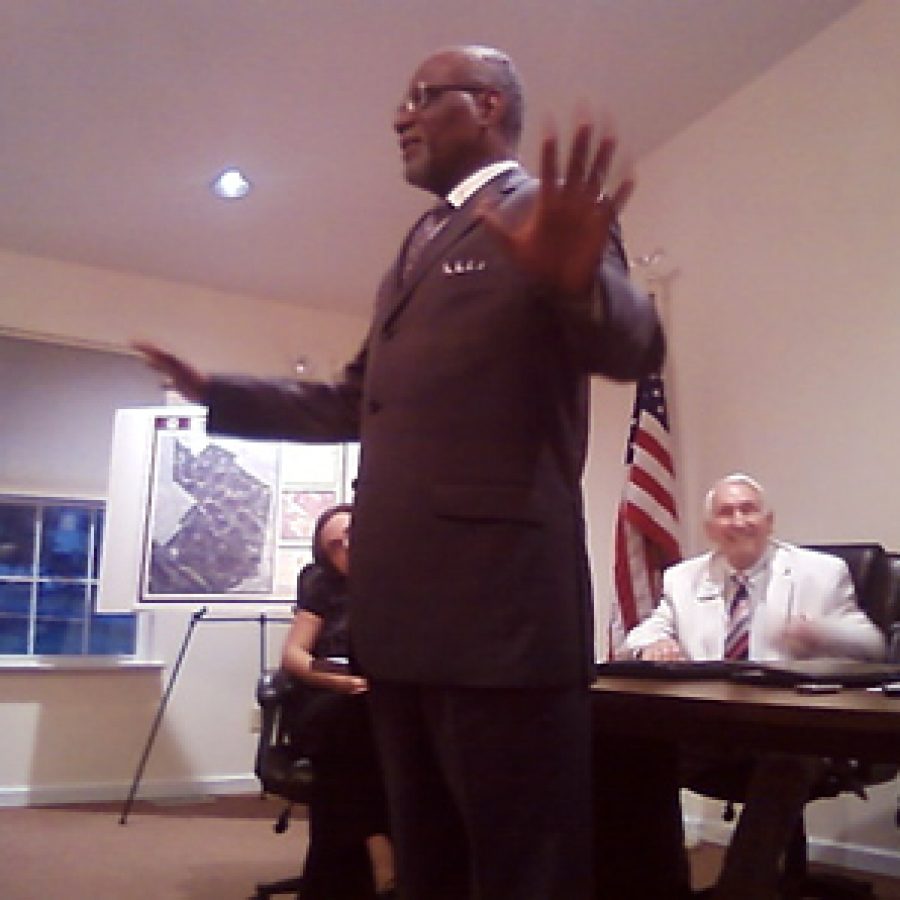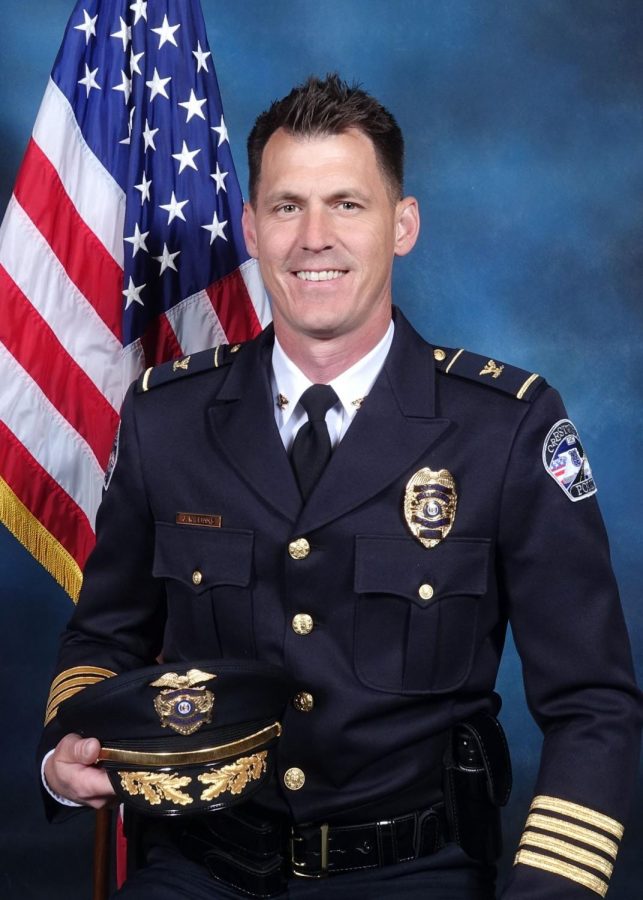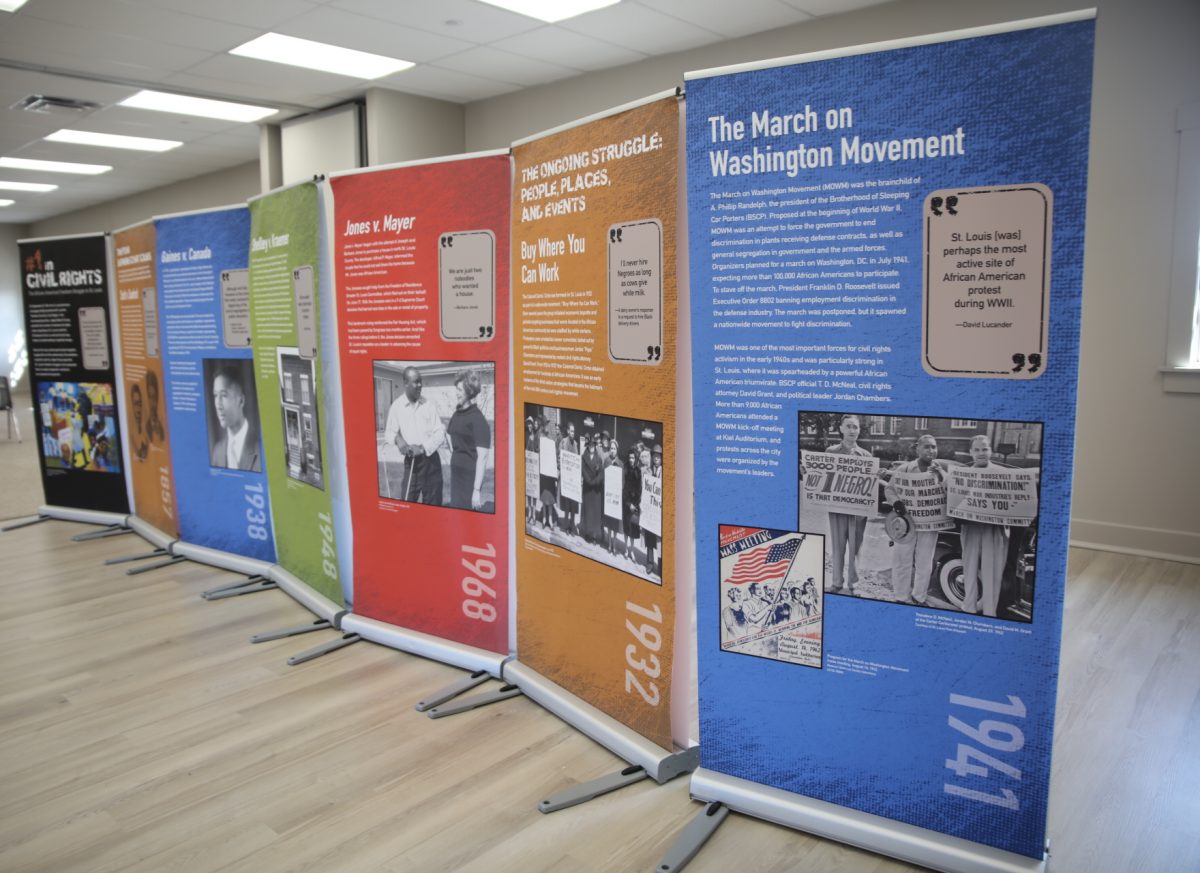County Executive Charlie Dooley defended the county’s trash-collection districts last week, contending the program has cut residents’ trash bills and reduced the number of trucks and cans on the streets.
Dooley told a group of Grantwood Village residents at a Board of Trustees meeting that when the county contracted with haulers three years ago to provide exclusive service in unincorporated areas, it was no different than what municipalities already were doing.
When he joined the County Council in 1995, Dooley said constituents in the 1st District frequently brought up the topic of trash collection.
“That’s all I heard about: ‘I’ve got four or five trucks coming down my street every week. Can you do something about it?'” Dooley said. “There are places in north county that people pay $60 a month for two trash pickups. Some places are $30.
“That is documented proof. The reason why I know it is because a couple of my directors live in north county and told me that’s what they pay: $60 a month …
“We had people on different streets paying different things and trucks in the area every day of the week, trash cans out every day of the week.”
Unincorporated areas were divided into eight trash districts in 2008. Residents are required to set up service with their district’s hauler or face prosecution. Unauthorized trash companies are prohibited from providing waste collection.
Officials have said they established the program as a way to standardize service, encourage recycling, save unincorporated residents money through competitive bidding and reduce the frequency of trash trucks on the streets. But many residents — particularly in south county, where four of the eight districts are situated — have argued that the program took away their right to choose their hauler or whether to have trash service at all.
And waste haulers who were not awarded trash district contracts contend they’ve lost a significant amount of business as a result of the program.
Several lawsuits have been filed over the establishment of the program. In one suit, a ruling is pending on how much in damages the county must pay three haulers that successfully argued they did not receive a state-required two years’ written notification before the trash districts’ establishment.
The state Supreme Court recently ruled 5-2 that the trash program did not need voter approval as alleged by three residents in a class-action suit. Another class-action suit alleging the program violates the Missouri Constitution’s Hancock Amendment is scheduled to go before the high court next month.
One resident, David Skaer of Concord, appealed his conviction in circuit court for not having trash service. Representing himself before the state appellate court last year, Skaer successfully argued that he recycles everything and doesn’t need trash service.
Dooley addressed the program’s critics last week.
“My friends, you can say what you want, but you can’t live in a house that doesn’t have trash; it’s impossible,” he said. “I don’t care how much recycling you do; it is impossible to live in a house and not generate trash. And when somebody tells me: ‘I moved in unincorporated St. Louis County because I get to pick who my trash hauler is,’ something is wrong if you expect me to believe it.
“Every municipality has a franchise for trash pickup,” Dooley added. “They all do. St. Louis County isn’t doing anything different than anybody else. Absolutely nothing different. We bid it out to the lowest bidder, and guess what? The first three years we did it, we saved $6 million. And the next five years, it’s even cheaper than it was the first three years.
“Why would you not do it? It’s trash; get it out of the way.”
Grantwood officials invited the county executive to speak at last week’s regular monthly board meeting, and Dooley said it was the first municipality to do so. Board Chairwoman Cathy Forand cited the fact that Grantwood Village contracts with the county to provide a number of services, notably police protection.
Dooley stressed the need for regional collaboration by the county, its 91 municipalities and St. Louis city — noting that while communities such as Grantwood Village have their own identity, “the world sees us as the St. Louis metropolitan region.”
However, resident Walter Rust asked Dooley at one point that if he was so supportive of the county and its cities working together, “why did you fight so hard” against the village’s proposal to annex the former Busch property along Gravois Road.
The county Boundary Commission in March denied the village’s request to annex nearly 100 acres of unincorporated land south of Gravois Road. The property once was owned by Andrew Busch and is across from Grant’s Farm.
Residents wanted the property in Grantwood’s jurisdiction to have some control over future development of it. They contended the annexation was a logical extension of the town’s boundary.
But the county argued that it was in a better position to both manage the area and plan for its future development.
“We look at it from a holistic point of view: What do you have to offer? What’s the budget going to be? What improvements are you going to have?” Dooley told Rust. “Just because it’s next to you, doesn’t mean you’re the best for that particular area. You’re good at what you do right now, but if you expand, do you have a budget that can take care of it? Are you going to provide different services?
“What difference are you going to make other than saying: I don’t want anybody moving next door to me? What’s the difference? What are you going to provide? We want to look at it from a realistic point of view, budgetary and cost-effectiveness.”
Rust said the town, which is mostly residential, was trying to “protect our area.”
“Since it’s under St. Louis County’s control, they could technically put a QuikTrip on that corner, they could put a Wal-Mart over there, which would affect the quality of life, not only in Grantwood Village but in all the subdivisions around us,” Rust said.
Dooley replied that county planners would take into consideration a number of factors, such as traffic volume, before endorsing any future development of the area.
“I think that we have the best team in planning and about doing the numbers about what makes sense …,” Dooley said. “Are we perfect? No. But I think we’re pretty darn well close to doing right and having a reason for what we’re doing and not just saying we’re blocking or stopping somebody.”
Rust said, “Are you saying that St. Louis County can make a better decision than the people that live in the area?”
Dooley said, “I’m just saying that St. Louis County takes all that into consideration and those areas are always involved in the process.
“Anytime St. Louis County does any kind of zoning, planning or anything like that, there’s always a public hearing on it for all interested residents to come in and voice their opinions. Sometimes they win, and sometimes they don’t.”
Rust said, “I think most times they don’t.”
“Not necessarily, sir. Not in my experience,” Dooley said, later adding, “… I don’t know of any system that’s perfect. I always say this over and over again: There is no law or ordinance anybody can make where everybody’s going to be happy all of the time. It simply is impossible; you can’t do it. It’s better to mitigate the loss as best you can …”









